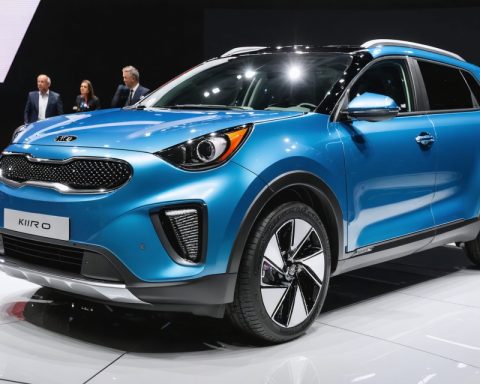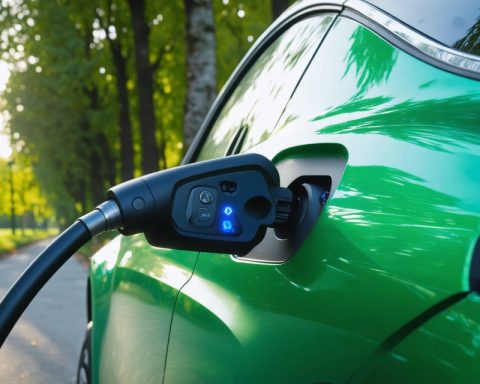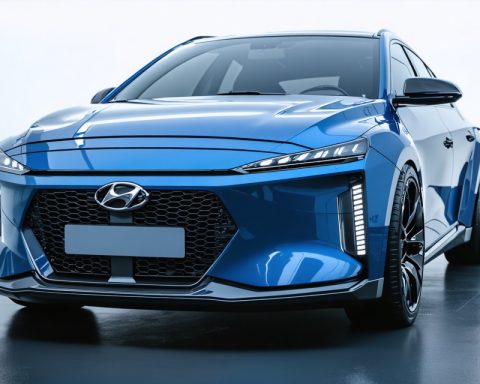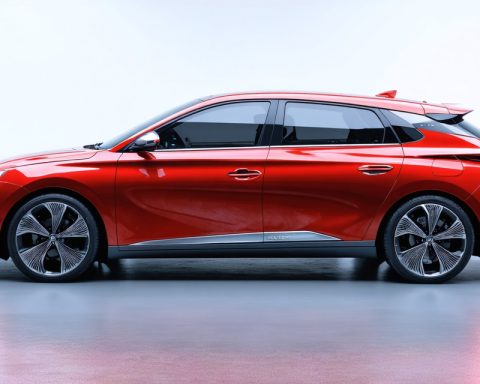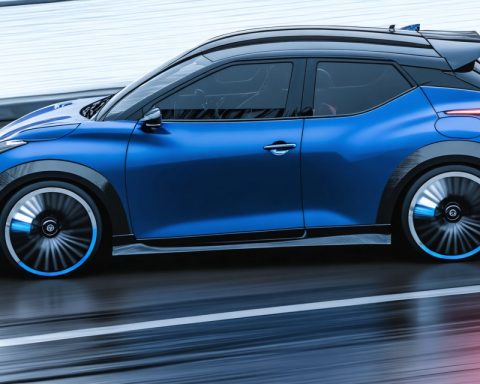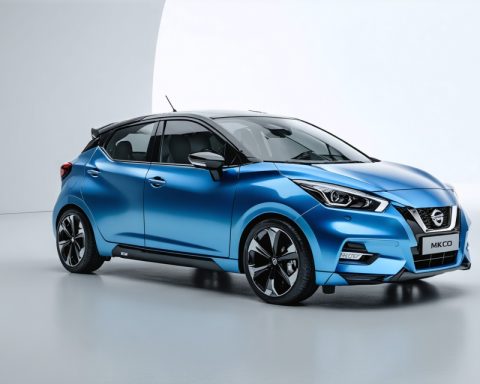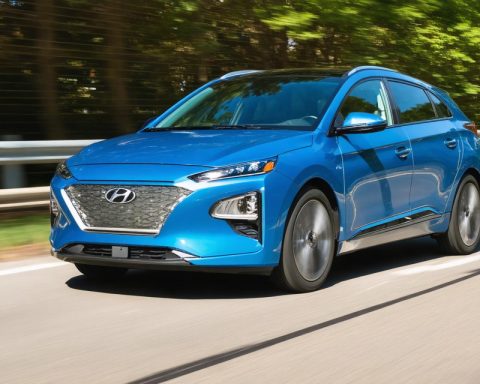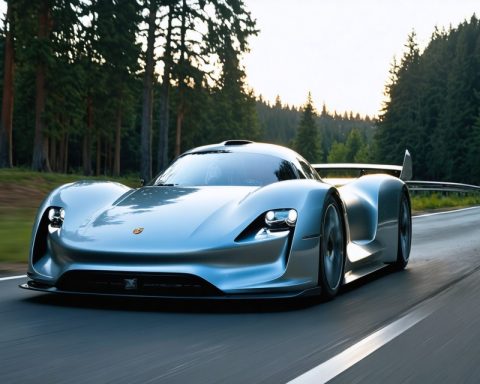- Electric vehicles (EVs) are swiftly becoming popular in the US due to environmental concerns and rising fuel costs.
- A Tata Consultancy Services survey indicates 72% of Americans prefer EVs for their next purchase, compared to 31% in Japan.
- Young drivers, especially those aged 18 to 25, are leading the shift towards EVs, motivated by technological and environmental consciousness.
- Auto manufacturers are expanding EV offerings, leading to increased consumer satisfaction and market adaptation.
- This shift signifies a critical move towards sustainability, as battery technology and infrastructure improve.
- The trend marks a significant evolution from traditional gas-powered vehicles to forward-thinking, eco-friendly transportation solutions.
Beneath the hum of US highways lies a transformative shift in the automotive landscape—an electric hum. As more drivers stroll into showrooms, a surprising factor now dominates their decision-making mountains: the allure of an electric vehicle (EV).
Amid rising concerns over environmental sustainability and fuel costs, electric cars are not just a futuristic novelty but are fast becoming the mainstay for American consumers. The momentum is clear and compelling. A robust survey conducted by Tata Consultancy Services revealed that a remarkable 72% of US respondents are leaning toward choosing an EV for their next ride. This finding highlights a growing enthusiasm that leaps well ahead of global statistics—far surpassing the mere 31% of potential EV purchasers in Japan.
In a nation historically known for its love affair with gas-guzzling muscle cars and vast open roads, this shift might seem almost radical. Yet, it underscores a vibrant evolution in consumer preferences. This transition is not just driven by environmental awareness; it’s also fueled by the sizzling excitement around technological advancements—think instant torque, sleek designs, and the digital integration of today’s smart vehicles.
Age plays a pivotal role in this electrifying trend. Younger drivers, ever attuned to technological advancements and the environment’s pulse, are leading the charge. The survey illustrates that nearly half of the young adults aged 18 to 25 are incredibly open to embracing an eco-friendly lifestyle with their next car purchase. Meanwhile, the 26 to 35 age bracket also shows a strong penchant for EVs, albeit slightly more reservedly. In stark contrast, older age groups maintain a tepid embrace, perhaps echoing a nostalgia for traditional fuel vehicles or hesitance toward newer tech.
Auto manufacturers have taken notice. The appeal of electrics is reflected in an expanding array of offerings, tapping into diverse aesthetics and functionalities that cater to every driver’s desires. Not surprisingly, more than half of those surveyed express satisfaction with the current electric models in the market, a testament to the automotive industry’s agile response to this societal shift.
The accelerating acceptance of electric vehicles in the US is more than just a fleeting trend—it marks a critical juncture in the nation’s journey towards a sustainable future. This growing inclination towards electric mobility suggests a widespread awakening to the benefits of clean energy and innovation. As battery technologies improve and infrastructure expands, the adaptation and eventual dominance of EVs on American roads seem not only plausible but imminent.
The engine of change roars quietly yet powerfully, heralding an era defined less by fossil fuels and more by forward-thinking technology and eco-conscious choices—a transformation igniting the roads with not just new vehicles, but new possibilities.
The Rise of Electric Vehicles: What’s Driving America’s Green Revolution?
Understanding the Shift to Electric Vehicles in the US
The transformation in the automotive landscape is gaining traction in the US—fueled by consumer preferences tilting towards electric vehicles (EVs). Factors such as environmental concerns, fuel efficiency, and cutting-edge technology are compelling consumers to opt for EVs. Below, we delve deeper into the unseen facets of this transition, providing valuable insights and predictions.
Technological Advancements Fueling the EV Boom
One of the primary drivers of the shift to EVs is the leap in technology that these vehicles embody. Recent models offer an enticing mix of features:
– Instant Torque: Electric motors deliver power directly to the wheels, ensuring faster acceleration and a smoother ride compared to internal combustion engines.
– Smart Features: Many EVs come equipped with advanced driver-assistance systems (ADAS), connectivity features, and in-dash technology that integrate with smartphones and smart home devices, offering a futuristic driving experience.
– Battery Advancements: Improvements in battery technology have increased the range of EVs, addressing the range anxiety that once plagued potential buyers.
Real-World Use Cases and Practical Considerations
Adopting EVs comes with a range of practical benefits and considerations:
– Cost Savings: While EVs often have higher upfront costs, owners can benefit from lower running costs, including cheaper electricity compared to gasoline, reduced maintenance, and potential tax incentives.
– Charging Infrastructure: Expansion of charging stations across the US is making it more feasible for EV owners to travel long distances without worry.
Industry Trends and Market Forecasts
The EV market is set for exponential growth:
– Increased Offerings: Auto manufacturers are rapidly expanding their EV portfolios, introducing a variety of models that span budget options to luxury electric cars.
– Market Penetration: The adoption rate of EVs is expected to triple in the next five years, with the US market poised to see significant retail growth as more options become available.
Pressing Questions and Expert Insights
– Are EVs truly environmentally friendly? While manufacturing EVs entails significant energy use, their operation typically has a smaller carbon footprint over their lifetime compared to conventional vehicles.
– How do EVs perform in various climates? Cold weather can affect battery performance, but continuous innovations in battery technology are addressing these challenges.
Pros and Cons of Electric Vehicles
Pros:
– Environmentally friendly
– Lower long-term costs
– Advanced features and technology
Cons:
– Higher initial purchase price
– Limited charging infrastructure (in some areas)
– Potential range limitations
Actionable Recommendations for Potential Buyers
– Research Incentives: Look into federal and state incentives that can subsidize the cost of an EV purchase.
– Assess Lifestyle Needs: Consider your daily commute and access to charging stations to determine if an EV fits your lifestyle.
– Stay Updated on Innovations: Keep an eye on the latest developments in EV technology and battery life.
For more information on the latest in automotive technology and industry trends, visit Cars.com.
By understanding the intricate dynamics behind the rise of electric vehicles, consumers can make informed decisions that align with both technological advancements and personal values. This progressive shift not only signifies a new era of automotive engineering but also heralds an age of eco-conscious consumerism.


